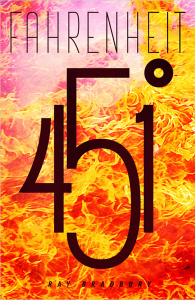
Fahrenheit 451, by Ray Bradbury, was named for the temperature at which paper burns. That’s the subject of the novel, which is set in a dystopian society in the future where books are forbidden for the good of the public. The role of the fireman has become burning books and the homes of anyone found with them. Television offers the public all the entertainment they need, and reading is not tolerated even as an eccentricity.
Guy Montag is a fireman who finds pleasure in nothing more than burning and is perfectly content with his life—until, that is, he meets his new neighbor, “seventeen and crazy” Clarisse McClellan. Clarisse is bright and vital and tells Montag of the days when firemen put out fires and people were free with their thoughts, and dances off with a goodnight and a question: “Are you happy?”
Montag is certain he is. And then suddenly, he realizes he has not been for a very long time. Shaken, Montag returns home only to find his wife has attempted suicide; she survives, but cannot answer why she overdosed on her sleeping pills. In fact, she insists it never happened.
Meanwhile, Clarisse and Montag strike up a friendship, and he begins to look forward to hearing her tell him of what the world the used to be.
Suddenly, she disappears, and no one seems to know where the seventeen-year-old girl and her family have gone. Montag no longer has her perspective to offer him clarity, and in desperation he steals a book. He begins to question everything he has ever known, and soon, he understands that books aren’t truly hazardous at all. Now, he knows that the real dangers he faces aren’t contained between printed pages.
Bradbury spins a convincing, frightening tale of how losing ourselves intellectually translates to losing ourselves as human beings. Written in the McCarthy Era, Bradbury ‘s subtle warning about limiting literature is still relevant and slightly ironic—the book has been banned in several places since its publication in 1953.
The writing is poignant and powerful, and the plot is intriguing. I would recommend reading the novel slowly, if you can—Bradbury’s plot points tend to be expressed through Montag’s emotions, and are not always clearly stated. However, the book will probably compel you to keep reading until the final word.



































